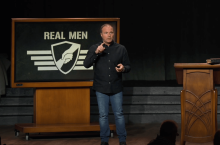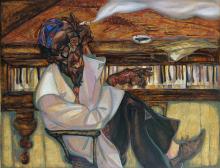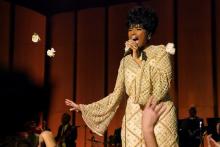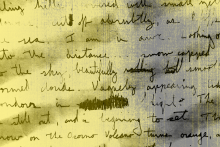Opinion

People in the United States have deeply conflicting understandings of our nation’s history: Are we a nation that guarantees “liberty and justice for all”? Or are we a nation that will continue to confine this promise to only certain Americans, falling short of realizing this promise for all? When we explore these questions, we start to see that many injustices that show up today have been with us since the nation’s founding.

Muslim detainees at Guantanamo are “indefinite prisoners of war,” held on suspicion of crimes they may or may not have committed. It would be easy to believe that Guantanamo is unique in regards to how it treats those the United States has deemed its enemies. But in reality, Guantanamo is an extension of the U.S. prison system.

What does it mean, now two decades past this traumatic event, to “never forget” 9/11? And why are we simultaneously encouraged to “move on from the past” when it comes to other great American tragedies, like the genocidal erasure of Indigenous peoples, or the horrific violence against Black people from chattel slavery through Jim Crow?

For those of us who have a relative, friend, or church member suffering from mental illness, I pray we turn away from the dangerous belief that mental illness is something that can be prayed away. Keep praying, but stop telling us to pray in an effort to rid ourselves of mental illness because it gives more power to our shame. In addition to your prayers, take action that helps.

It would be too reductive — and too convenient — to suggest that Driscoll’s authoritarianism was solely a product of his brash, conservative theology. Catholic, mainline, and progressive Christians are not immune. Many forms of theology are susceptible to manipulation and abuse, and many others are intrinsically harmful — even if the damage isn’t always easy to discern.

The only solution to this noisy world is good noise from people who are attuned to the world’s hurt.

Lost in much of the promotional hype leading up to Solar Power was the quiet news that in the interim between her previous album and her latest, Lorde had started therapy. Famously private, she didn’t share much more than that, but she doesn’t need to — and anyway, the new sonic landscape of the album speaks for itself. Whereas the propulsive and explosive beats of Melodrama mirrored the rhythm of thoughts racing out of your control, the bubbly basslines of Solar Power reflect the steady progression of growth she’s experienced in the years since.

Is voting a right or a privilege? On Tuesday, as the House passed the John Lewis Voting Rights Advancement Act, I was filled with hope for our democracy. But overshadowing that hope was moral indignation, as I realized that not a single Republican member voted in favor of the act — further proof that voting rights has metastasized into a hyper-partisan issue in 2021, despite its long history of bipartisan support.

Whenever I am writing, editing, or reading, it feels wrong to be without a cup of coffee (black, no sugar). I know I am not the only editor who feels this way. [Editor’s note: Can confirm] Also, I feel confident in speaking for the editorial team when I say the 10 stories we have picked for you this week are best enjoyed with a piping-hot cup of joe.

The earth quakes. It rumbles. It trembles, sort of like a roar, a shiver. I didn’t see it; I’ve never experienced it, but I heard the news. “1,900+ Haitians are believed to be dead,” the faint voice of the news reporter says over my car radio, “and hundreds are believed to be missing.”
Another headline reads: “The latest on Afghanistan as Taliban take charge.”
Another: “13-year-old Mississippi girl dies of COVID-19.”

In our pursuit of justice, we must learn from projects like CRT which can illuminate the realities of multiracial communities in which the church ministers. To deny these realities or reject tools that help us perceive correctly, is to dishonor the call to neighbor-love and hospitality we have received.

Questions to help you use your privilege for the flourishing of all.

Christianity leaves a lot to interpretation — both biblically and apparently, culinarily.

Respect is a must-see work, moving in its revelation of a superstar whose glow many of us have seen, the shadows surrounding them more hidden from view. Ms. Franklin was not just an incredible singer but also a civil rights activist like her father.

This week, the United Nations Intergovernmental Panel on Climate Change (IPCC) released a report on the state of the climate crisis. It is a report that frames, in the cautious language of science, the dire state of the world. This panel of experts from around the world found that warming of 1.5 to 2 degrees Celsius in the next century is certain unless there are extreme and immediate cuts in greenhouse gases. This level of warming would spread and intensify the kinds of extreme weather — hurricanes, wildfires, floods, and heat waves — we have seen unfold for over a decade. This report shows us the reality that our actions will not be enough to prevent catastrophic climate change. Immediate action on climate can prevent the worst effects of climate change — but catastrophe has already happened. Catastrophes are happening all around us.

My first memory of receiving Christ is forever entangled with a social faux pas that caused me stress and pain.

Recently, the Centers for Disease Control and Prevention and other world organizations announced that over 1.5 million children had already been orphaned because of COVID-19, with more losses likely to come. Those precious souls are in desperate need of support, but not the kind Christians typically give. Around the world, devastation is caused by the institutionalization of children in residential schools and orphanages. Sadly, these institutions across the globe are often financially supported by American churches and charitable Christians who are unaware of their limitations and risks.

The Federal Bureau of Prisons is piloting a program to replace physical mail to prisoners with scanned copies, a program I believe is extremely unjust and has urgent implications for the practice of our faith, both for Christians who are incarcerated and Christians on the outside.

This is for you: for all of us who have watched as our bodies and our minds and our very being were commodified by the people in power, and even as we gained influence and strength, we knew our value hinged only upon what we might do, how we might produce, all the while knowing that a physical or mental collapse could hasten our own destruction. So we keep going.
